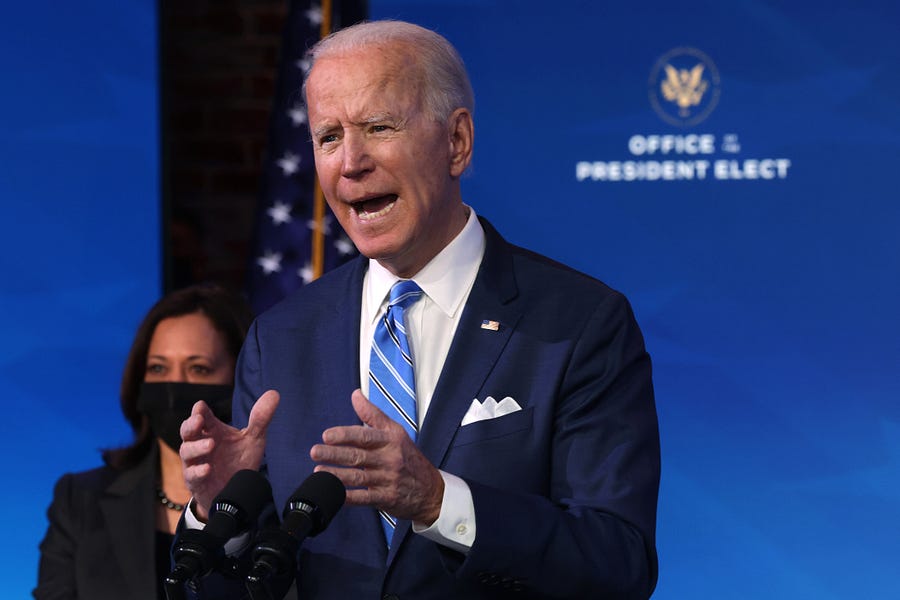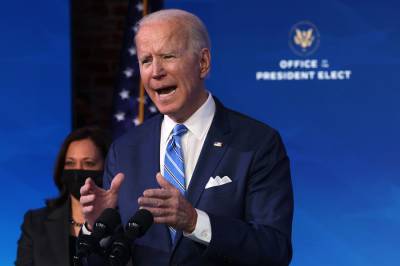President-elect Joe Biden has unveiled his first major legislative push: a $1.9 trillion package intended to combat the coronavirus pandemic, stimulate the economy, and provide relief to Americans. While a few of its proposals are necessary, too many others were just pulled from the old Democratic wishlist. This follows Obama Chief of Staff Rahm Emanuel’s old recession stimulus mantra of “never let a crisis go to waste.”
First, the positive: Biden would invest $160 billion in a national vaccination program and related health policies to stem the pandemic. Given the slow, bureaucratic rollout of the vaccines over the past month, it is absolutely necessary to expand testing and contact tracing, as well as launch community vaccination centers free of charge for vaccine recipients. Additionally, Biden would spend $170 billion preparing K-12 schools and institutions of higher learning to reopen safely within the administration’s first 100 days.
These two policies highlight Washington’s most pressing priorities: ending the pandemic, and then safely reopening schools so moms and dads can go back to work and resuscitate the economy.
But given that Congress only weeks ago enacted $900 billion in legislation to extend unemployment benefits and provide more aid to vulnerable businesses (among many other provisions), the additional holes for Congress to legitimately plug are rather limited. Yet Biden proposes more than $1 trillion in mostly extraneous proposals.
Perhaps most egregious is a proposal to more than double the federal minimum wage to $15 per hour—including for employees who regularly receive additional tips, for which the current minimum wage is $2.13. The nonpartisan Congressional Budget Office estimates that even gradually raising the minimum wage to $15 by 2025 in a growing economy would likely kill 1.3 million jobs, and perhaps as many as 3.7 million. Imposing a drastic minimum wage increase on small businesses that are already struggling to stay afloat during a recession is especially absurd. Moreover, forcing restaurants, which are failing at record rates, to raise their own tipped minimum wage by 600 percent is economic malpractice. Perhaps high-cost cities like New York City and San Francisco can afford a much higher minimum wage, but other parts of America with lower incomes and prices will not be able to absorb this policy. It has no business in a relief package.
Next, Biden would add $1,400-per-person relief checks to the recently enacted $600 checks, bringing the total to $2,000 per person. When combined with the spring relief checks, the typical family of four will have received $11,400 over the past year. While surely popular, there is no policy justification for these payments, given that most Americans receiving them have not lost income during the pandemic (indeed, personal income reached record levels after last year’s checks), and those who have lost their jobs have access to unemployment benefits replenishing 100 percent of their typical lost wages. Some Americans have fallen through the cracks, but $600 billion in relief checks (including those enacted in December) is excessive and irresponsible. They are not stimulative, either. Even if one accepts the Keynesian notion that spending is good and saving is bad, the 2020 checks were largely saved, and the improving economy suggests this new round will be saved at an even higher rate.
Biden would also extend emergency unemployment benefits through September with a $400 federal add-on that would exceed the lost wages for most laid off workers. And his plan to send $350 billion to state and local governments likely exceeds the amount that is needed.
Other expensive policies include many that have been deemed “temporary” but, as is often the case with such short-term government interventions, would likely be made permanent. Biden would expand the child tax credit to $3,000 per child (or $3,600 for children under age 6) and make it fully refundable. The $120 billion one-year cost will likely surpass $1 trillion over the decade after Congress extends this policy, just like previous child tax credit expansions. Other proposals to significantly expand the Earned Income Tax Credit (EITC), child care subsidies, family leave benefits, and Supplemental Nutrition Assistance Program (SNAP) benefits would also likely be made permanent, considerably raising the cost.
In short, President-elect Biden would use the pandemic to enact large, unrelated, permanent expansions of the federal government. The $1.9 trillion cost of this package would raise the total cost of the pandemic relief laws to approximately $5.3 trillion – heading well past $6 trillion when many of the “temporary” provisions are extended. That means roughly 20 percent of the total national debt at the end of 2021 would be driven by pandemic legislation. And Biden promises trillions more in additional spending for infrastructure, health care, college aid, Social Security, and other priorities.
It is currently in vogue to assert that deficits do not matter, and therefore all new spending is affordable. Certainly, Congress and the president are justified in spending the amounts necessary to end the pandemic and assist victims of the recession. Doing so is cheaper (and obviously more humane) than allowing the pandemic and recession to continue indefinitely. But that is not a blank check for trillions in permanent, unrelated spending. Even before the pandemic occurred, baseline budget deficits were headed toward $2 trillion annually by the end of the decade. CBO has also forecast a staggering $104 trillion in new borrowing over 30 years, mostly resulting from burgeoning Social Security and Medicare shortfalls. Biden would add new trillion-dollar commitments before Washington has figured out how to pay for its current ones.
Yes, interest rates are low today. However, there is no guarantee that rates will not rise in 5, 10, or 20 years. When that happens, Washington’s reliance on short-term debt means that nearly the entire national debt will roll over into those higher rates. And each percentage point that interest rates rise above the CBO baseline estimate would add $30 trillion in interest costs over three decades. Lawmakers are playing with fire if they believe that government debt can rise forever with no economic consequences.
By all means, Congress should approve vaccine spending to end the pandemic, and education assistance to reopen schools. But on the heels of a $900 billion economic relief bill enacted just weeks ago, Congress should not allow the recession to be an excuse for permanent, unaffordable government expansions.
Brian Riedl is a senior fellow at the Manhattan Institute. Follow him on twitter @Brian_Riedl.






Please note that we at The Dispatch hold ourselves, our work, and our commenters to a higher standard than other places on the internet. We welcome comments that foster genuine debate or discussion—including comments critical of us or our work—but responses that include ad hominem attacks on fellow Dispatch members or are intended to stoke fear and anger may be moderated.
With your membership, you only have the ability to comment on The Morning Dispatch articles. Consider upgrading to join the conversation everywhere.